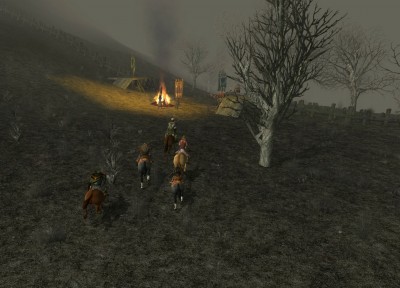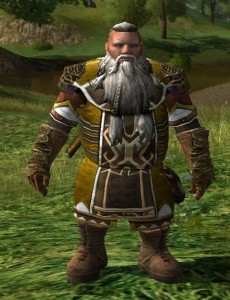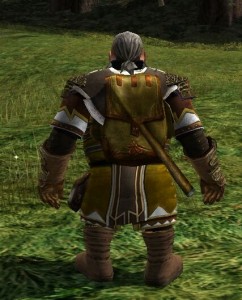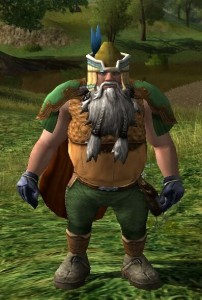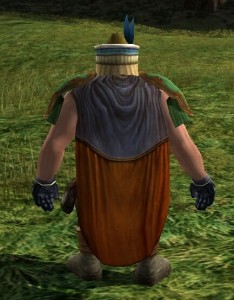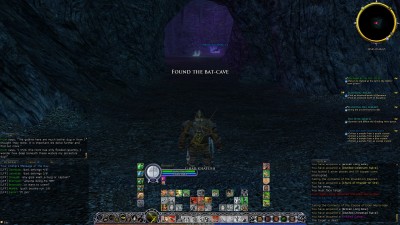I’ve really been enjoying Dungeons and Dragons Online since going back to the free-to-play Unlimited version, it’s a far better game than when I played for a month or so at launch. The fundamentals are the same (run around and hit stuff with swords), I always liked the way it captures the old pen and paper feeling of going on a dungeon crawl, but many little tweaks have improved the overall experience. Starting at the beginning, with character creation, templates make life much easier for anyone who hasn’t memorised the comparative benefits of all the D&D feats. Emerging from character creation into the game the tutorial is a distinct improvement on the original, which forced you to solo a few dungeons culminating in a bunch of kobolds and a cultist under a pub as I recall. Trivial for a fighter or barbarian, who’d merrily splatter their way through, tougher for a rogue, especially if specced more for dealing with traps than fighting, and potentially impossible for a wizard if they got their spell selection wrong (though who wouldn’t take magic missile?)
A major problem for me at launch was the way solo/duo content dried up almost immediately after finishing the tutorial. Not an entirely illogical design, in keeping with trying to preserve the ethos of group adventures, but led to much frustration in attempts to get groups together, find quests that everybody had etc., and there wasn’t much to do while pottering around waiting for some action to start. I believe one of the very early updates was the addition of some solo adventures, or “solo mode” for some existing adventures, so it was obviously an issue they were working on, and now there are plenty of options without having to form up a big old group. As well as the wider range of available quests that you’d expect, gradually added over time, the hireling system allows you to pad your group out with an NPC rather than spamming “LF healer” on all available chat channels for hours at a time.
The other main problem I had was grind. DDO is unique (or at least very unusual) in that it doesn’t give out XP for individual mob kills, I haven’t yet been sent to collect a random assortment of animal body parts that only a small fraction of beasts seem to possess, and it’s completely free of “kill ONE MEEEEELEON monster” type quests. Actually, that’s not strictly true: there is one quest where the only objective is to kill 200 kobolds, but that’s not so much a grind as comic relief; you decide to have a crack at it solo, just for a laugh, and you’re butchering kobolds with a single blow, laughing maniacally as you do, thinking you might have a good chance, but they just keep attacking, wave after wave, and you can’t kill them quick enough, and even though they’re only doing a couple of points of damage here and there it’s chipping away, and you’re trying to back off and use a healing potion but there’s so many of them, and… that’s when you realise you’re a rare giant monster spawn in an open world MMO. If you could somehow add the kobold “General” channel to your chat tab, I swear you’d see something like:
“GIANT MOB SPAWN AT THE RUINED CASTLE!”
“Where’s the ruined castle?”
“Centre of the map, noob”
“Let’s take it down!”
“ZOMGZ it just one-shotted me WTF?”
“Need more shaman, come on!”
“LFM Giant Mob team”
“It’s self healing, no way”
“Need to wear down its spell points”
“COME ON MORE DPS”
“It’s going down!”
“WOOOOO!”
“YEAH, WE RULE!”
“What did it drop, what did it drop?”
“Who got the lewt?”
“There’s nothing on the body!! NOTHING!”
“OMFG, I’m so writing a blog post about this…”
Anyway. Everything’s quests off in their own instances (dungeons and outdoor areas), which avoids the “kill ONE MEEEEEELEON monsters” grind, but potentially replaces it with doing the same instances over and over again. First of all there was the Waterworks; originally to go from the Harbour to the Marketplace you had to complete the Waterworks quest(s), a fairly tough and long series. Not so bad if you were a static group and all blasted through it at the same time, but if you were in a casual guild it was a right pain with everyone at different stages, and some people got thoroughly sick of going through the Waterworks several times to help out others as they reached it (and then again with an alt or re-rolled character). Having made it through to the Marketplace, there was another series that finally did for me. I can’t remember the precise details, but I think it was off from one of the Houses; a guild group formed up and we toddled off for a quest, through an outdoor area, which was a bit pointless as I recall, but did offer some opportunities for people to wander off on their own and get lost if they weren’t paying attention then run into big groups of mobs, or plummet down a cliff to certain doom, just to make sure it took about half an hour just to get everybody assembled at the start of the actual quest. In we went to this dungeon, I forget what the exact objective was, rescue some prisoners or find a key or something, and it was pretty neat; I was sneaking around searching for traps, we dispensed steely justice to whatever kobolds, gnolls or other beasties were hanging around, secured our objective, hurrah! That led to chapter two of the quest, which involved… going back into the exact same dungeon, with the exact same traps, and the same spawns, but winding up in a slightly different bit, or going slightly further than the first time. OK, fine, completed that objective, and chapter three of the quest was… to go back into the same dungeon! Again! And that still wasn’t the end of the quest series, but I had to head off after finishing that chapter.
Next time I logged in I shouted around to see if anybody fancied finishing off that quest series, and we ended up with a group with me on chapter four, somebody who’d finished the whole thing the previous night, someone else who’d had to bail out after chapter five, and a couple who hadn’t done it at all. So it was back to chapter one; into the dungeon, out of the dungeon, back into the dungeon, out of the dungeon, back into the dungeon (sixth time in pretty much the same instance now…) Things improved very slightly, as later in the quest chain either the early part of the dungeon was free from traps and mobs, or we went straight in to a later point in the dungeon, but I think it was a seven chapter quest that basically involved going back in to the same dungeon seven times, finally completing the thing hours later.
Next time I logged in I joined a guild group of similar level and we chatted about what quests to do. “Anything but (House Wherever)!” said I, cheerily. And of course once we worked out what level characters we had, what prerequisite quests were needed, what everyone else was thoroughly bored of etc, there remained only one possible choice for us: House Wherever. So I went back into that dungeon another seven times (would’ve been bad form to leave them rogue-less after all), and didn’t log in to the game for another three and a half years.
I’m hoping they’ve sorted that out now, certainly there seems to be a wider array of quest choices (albeit some of them requiring a purchase, but they have to make their money somehow); I don’t mind doing a dungeon a couple of times, or leaving it a couple of weeks between attempts, but 15+ runs of more-or-less the same dungeon within three sessions is taking the piss.
Trouble is, of course, MMOGs need content, and to satisfy voracious players they need lots of it. It takes far longer to create the content than to play it (reasons not to work on MMOGs part MMCIXV: spending days or weeks as a team perfecting a dungeon, adding quests and flavour text, placing the traps and spawns, testing it carefully and adjusting accordingly, then watching a bunch of munchkins steam through it in seven minutes flat shouting “LAWL!” and “PEWPEW!” as they go), so obviously it’s a temptation: if a dungeon’s good for one chapter, it’s good for seven! It’s something Champions Online seem to be suffering at the moment, with their Blood Moon event. Part of the event, the PvE side, is pure, unvarnished grind (though in fairness, apparently each crypt isn’t exactly the same, there are some minor changes in layout, but one run through of one crypt was quite enough for me.) One the plus side, the PvP side of the event is much better, I really enjoyed the zombie-survival mode (a team of five or six have to fight off waves of NPC zombie attackers plus one zombie-fied player, as each hero dies they get zombie-nated and join the undead; sort of British Zombie Bulldog), and I haven’t had a chance to try the hunters vs werewolves yet, but it sounds fun too. Let’s hope Champions can keep going for three years or so and keep improving like DDO.
